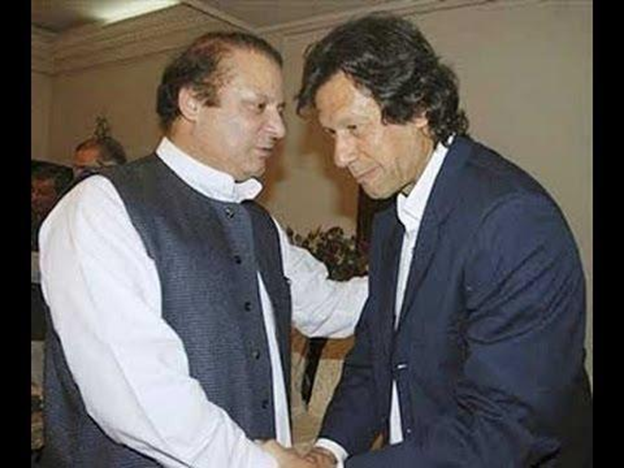SHARIF-KHAN TALKS COLLAPSE WITHIN HOURS, IMPASSE CONTINUES
In happier days!

NEW DELHI: As the Pakistan army made it clear that the only way out of the political impasse in Pakistan was through discussion, talks between Imran Khan’s Pakistan Tehreek-i-Insaf (PTI) and Tahirul Qadri’s Pakistan Awami Tehreek (PAT), and the Nawaz Sharif government collapsed within a few hours.
PTI and PAT pulled out of the talks saying that the government was trying to prevent movement in Islamabad’s “red zone,” where the marches led by the two parties, respectively, had reached, eventuating in a sit-in, before talks commenced on Thursday.
PTI leader and member of the negotiations committee Arif Alvi told Pakistan’s Dawn News, “They should tell us where they want to take this dialogue. They have ‘containerised’ us. It is impossible to get into or out of the Red zone… We cannot negotiate with them as long as they continue with their crackdown (against party workers).”
Pakistani media reported that whilst PTI’s main demand was to push for Nawaz Sharif’s resignation, PAT’s agenda was centred on the resignation of the Pakistani Prime Minister’s brother, Punjab Chief Minister Shahbaz Sharif.
As Khan and Qadri pushed through with their demands, the National Assembly passed a resolution rejecting the PTI’s and PAT’s “unconstitutional demands.” At a Thursday session of the NA, a resolution demanding the supremacy of the constitution and law, was unanimously approved.
The full text of the resolution is as follows:
“This House rejects the unconstitutional demands from certain political parties for the resignation of the Prime Minister and the dissolution of the National Assembly and deplores the extremely derogatory, defamatory and inflammatory language used by leaders and members of these parties in their speeches. This House resolves to uphold the supremacy of the Constitution of the Islamic Republic of Pakistan, the sovereignty of Parliament, which embodies the will and the mandate of the people of Pakistan, and the prevalence of the rule of law. It reiterates its resolve to ensure that the democratic system continues to function and flourish in accordance with the provisions of the Constitution.”
Earlier, the United States issued a strong statement condemning Khan and Qadri’s actions, saying extra-constitutional transfer of power in Pakistan is unacceptable, and that those “attempting to impose these changes” should refrain from doing so. “Nawaz Sharif was elected and is prime minister. There is a government that was elected and is in place,” Marie Harf, State Department deputy spokesperson, said, adding ““We support the constitutional and electoral process in Pakistan...That was a process they followed, an election they had, and we are focused on working with Pakistan… And we do not support any extra-constitutional changes to that democratic system or the people attempting to impose them.”
Khan, in turn, accused the US of interfering in Pakistan’s internal affairs, adding that the Pakistan Muslim League - Nawaz (PML-N) government is a “servant of the US” that “polishes the shoes of the Americans”.
Referring to his main charge, Khan, who is calling for Sharif’s resignation based on suspicions that the elections were rigged, asked, “If an election took place in the US and a Congressman said that a majority of the votes could not be verified, wouldn't that constitute a full blown enquiry in America?”
Qadri, who has found common ground with Khan on the issue of Sharif’s resignation, differs on the grounds that the PAT movement, instead of calling for fresh elections as Khan is, wants to replace the current government with a national government composed of technocrats.
Both leaders have led their marches, with the PTI’s “Azadi” March and PAT’s “Inquilab” March, that commenced on Pakistan’s Independence Day 14 August, to Islamabad, vowing to push through till Sharif and his cabinet resign.
Although the Sharif government had not moved to stop the marches, its actions demonstrated that it took the challenge seriously. This would explain the ban on gatherings, the impounding of vehicles, the closing of petrol stations and the deployment of troops to Islamabad. Ironically however, Sharif’s decision to deploy the army has given his critics more fodder, seemingly indicating that Pakistan’s civilian administration is still heavily reliant on the country’s military, which has ruled Pakistan through a series of coups, for protection.



